Socialism
John M. Kirk, Health Care without Borders: Understanding Cuban Medical Internationalism (Gainesville, FL: University Press of Florida, 2015), 376 pages, $79.95, hardback.
When the Ebola virus began to spread through western Africa in fall 2014, much of the world panicked. Soon, over 20,000 people were infected, more than 8,000 had died, and worries mounted that the death toll could reach into hundreds of thousands. The United States provided military support; other countries promised money. Cuba was the first nation to respond with what was most needed: it sent 103 nurses and 62 doctors as volunteers to Sierra Leone. With 4,000 medical staff (including 2,400 doctors) already in Africa, Cuba was prepared for the crisis before it began: there had already been nearly two dozen Cuban medical personnel in Sierra Leone.… Since many governments did not know how to respond to Ebola, Cuba trained volunteers from other nations at Havana’s Pedro Kourí Institute of Tropical Medicine. In total, Cuba taught 13,000 Africans, 66,000 Latin Americans, and 620 Caribbeans how to treat Ebola without being infected. It was the first time that many had heard of Cuba’s emergency response teams.… The Ebola experience is one of many covered in John Kirk’s new book Health Care without Borders: Understanding Cuban Medical Internationalism. | more…
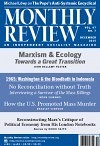
In this issue we feature two articles on the 1965–1966 mass killings and imprisonments in Indonesia. The army-led bloodbath was aimed at the near-total extermination of members of the Indonesian Communist Party (PKI), then a highly successful electoral party with a membership in the millions.… In all, an estimated 500,000 to a million (or more) people were murdered. Another 750,000 to a million-and-a-half people were imprisoned, many of whom were tortured. Untold thousands died in prison. Only around 800 people were given a trial—most brought before military tribunals that summarily condemned them to death.… The United States…was involved clandestinely in nearly every part of this mass extermination: compiling lists of individuals to be killed; dispatching military equipment specifically designated to aid the known perpetrators of the bloodletting; offering organizational and logistical help; sending covert operatives to aid in the “cleansing”; and providing political backing to the killers.… [T]he mass killings…[were carried out with the active] complicity of the U.S. media. | more…
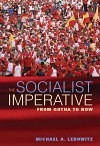
Michael A. Lebowitz explores the obvious but almost universally ignored fact that as human beings work together to produce society's goods and services, we also “produce” something else: namely, ourselves. Human beings are shaped by circumstances, and any vision of socialism that ignores this fact is bound to fail, or, at best, reproduce the alienation of labor that is endemic to capitalism. But how can people transform their circumstances in a way that allows them to re-organize production and, at the same time, fulfill their human potential? These essays repay careful reading and reflection, and prove Lebowitz to be one of the foremost Marxist thinkers of this era. | more…
Like many other leftists working in labor or community organizations, I have long struggled to understand the role I can play in building a larger left movement. I have spent nearly a decade organizing for the Service Employees International Union (SEIU) and have only recently caught a glimpse of what a vibrant and popular leftist practice could look like.… In this analysis, I take inspiration from Antonio Gramsci’s ideas. He described a “war of position”—a protracted revolutionary effort to create an anti-capitalist hegemony—as a methodology for anti-capitalists in advanced industrial countries. Counter-hegemony is a process, built by concrete effort both through political education and political action. As a labor union organizer, I have become quite skilled at political action, but not at political education.…One alignment of organizations in Minnesota—Minnesotans for a Fair Economy (MFE)—has the potential to be part of such a counter-hegemonic process. On a day-to-day basis, member organizations of MFE organize people to confront their bosses and banks, as well as the corporations holding back their communities. On a sporadic basis, the member organizations come together to create a new narrative of what kind of a world we want.… It was in a MFE “week of action” that I first began to understand how the process of creating a counter-hegemony might play out in practice. | more…
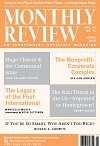
The Review of the Month in this issue (“Chávez and the Communal State” by John Bellamy Foster) focuses on the revolutionary political strategy introduced by Hugo Chávez and the Bolivarian movement in Venezuela. In the process it addresses how István Mészáros’s Beyond Capital played a key, strategic role in the development of Chávez’s thinking. Beyond Capital is a daunting philosophical work of around a thousand pages, while many of his other writings are nearly as challenging. MR readers will therefore be pleased to learn that we have just published a new book by Mészáros, The Necessity of Social Control (Monthly Review Press, 2015), expressly designed, as Foster writes in the book’s “Foreword,” as “an easily accessible work,” providing “a way into his thinking for the uninitiated” (9).… Yet, Mészáros’s new book is much more than that. | more…
On the Transition to Socialism in Venezuela
On October 20, 2012, less than two weeks after being reelected to his fourth term as Venezuelan president and only months before his death, Hugo Chávez delivered his crucial El Golpe de Timón (“Strike at the Helm”) speech to the first meeting of his ministers in the new revolutionary cycle. Chávez surprised even some of his strongest supporters by his insistence on the need for changes at the top in order to promote an immediate leap forward in the creation of what is referred to as “the communal state.” This was to accelerate the shift of power to the population that had begun with the formation of the communal councils (groupings of families involved in self-governance projects—in densely populated urban areas, 200–400 families; in rural areas, 50–100 families). The main aim in the new revolutionary cycle, he insisted, was to speed up the registration of communes, the key structure of the communal state. | more…
Interview with Marcello Musto
The International Working Men’s Association (IWMA), nowadays better known as the First International, was founded in London in September 1864. Despite the importance of the event, there has not been much attention to its 150th anniversary. To an extent, this reflects the situation of the present day, with the hegemony of neoliberal politics and, conversely, the weakness of the left, that does not seem to be interested in its own history and the lessons that might be extracted from past experiences.… Luckily, there are exceptions. Marcello Musto, an assistant professor of sociology at York University in Toronto, has contributed to two important presentations of the experience of the First International… The International after 150 Years: Labour Versus Capital, Then and Now …[and] the first English-language anthology on the IWMA, Workers Unite! The International 150 Years Later. | more…
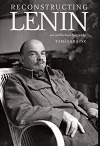
Vladimir Ilyich Lenin is among the most enigmatic and influential figures of the twentieth century. While his life and work are crucial to any understanding of modern history and the socialist movement, generations of writers on the left and the right have seen fit to embalm him endlessly with superficial analysis or dreary dogma. Now, after the fall of the Soviet Union and “actually-existing” socialism, it is possible to consider Lenin afresh, with sober senses trained on his historical context and how it shaped his theoretical and political contributions. Reconstructing Lenin, four decades in the making and now available in English for the first time, is an attempt to do just that. | more…

Over the last few decades Marta Harnecker has emerged as one of Latin America’s most incisive socialist thinkers. In A World to Build, she grapples with the question that has bedeviled every movement for radical social change: how do you construct a new world within the framework of the old? Harnecker draws on lessons from socialist movements in Latin America, especially Venezuela, where she served as an advisor to the Chávez administration and was a director of the Centro Internacional Miranda. | more…
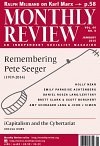
The publication of socialist books in the United States has always encountered serious institutional obstacles. This can be seen in the enormous hurdles that stood in the way of the successful publication 130 years ago of the English translation of Engels’s The Condition of the Working Class in England (1845)—today recognized as the classic account of the impact of the Industrial Revolution on workers. In 1885 Florence Kelley (-Wischnewetzky), the daughter of William D. Kelley, a U.S. Congressman and supporter of Lincoln, translated Engels’s book into English. Her initial plan was to publish the translation in the United States with the respected publishing firm of G.P. Putnam & Co. However, Putnam declined to publish it on the grounds that the book was outdated…and did not apply to U.S. industrialization, where such conditions of class exploitation were supposedly absent.… It is owing to these difficulties, associated with the U.S. publication of his book, that we have the benefit of some of Engels’s more important comments regarding the problem of publishing socialist works in a capitalist society. | more…
Our friend and comrade Pete Seeger died a year ago this month, on January 27, 2014. Pete was a long-time reader of Monthly Review and, occasionally, a writer for this magazine. Harry Magdoff used to say that when a letter arrived from Pete, nearly always handwritten and often pages long, responding to an article or suggesting a topic to be covered or a book to be reviewed, it would go right home with him, to be pondered, considered, answered, and, especially, enjoyed. Seeger’s communications were never innocuous: he would tell the editors that something MR had published was wrongheaded (or, sometimes, right-headed); he would take an idea, turn it over, and suggest where to go with it. Like his music, Seeger’s letters demanded engagement, participation—and action. He had a special place in the MR family. | more…
By vocation, Marx was not an economist, or a philosopher, or a sociologist. He was a revolutionary who, being deprived of the opportunity of participating in revolutions in the years after 1848, turned to the detailed analysis of the economic system he wanted to overthrow. Marx never ceased to stress the liberating quality of practical activity; but he himself was compelled by the circumstances of his time to devote most of his life to theoretical work. | more…





